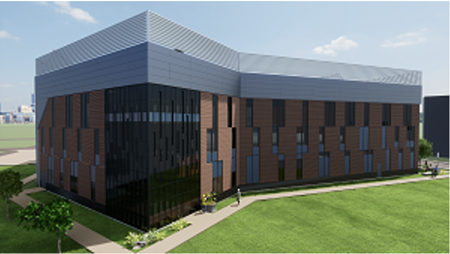
Henry Ford Health System Central Utility Plant Project
Henry Ford Health Energy Partners
Leverages Benefits of District Utility Projects. The Project will assist HFH to substantially improve its energy efficiency, significantly reduce greenhouse gas emissions, enhance energy resilience, and help control costs through several key innovations. First, the development of its own facility for electric heating and cooling via a hot and chilled water pump system will enable HFH to phase out reliance on fossil fuels. Additionally, the facility will incorporate waste heat recovery technology, which is expected to supply approximately 75% of its heating needs, greatly enhancing energy efficiency. A digital energy management system will continuously monitor and optimize energy use, minimizing waste. The hub will also rely on renewable electricity through power purchase agreements, contributing to a substantially reduced carbon footprint. With all these strategies in place, the Project is expected to help HFH reduce its emissions by half by 2030 and achieve its ultimate goal of net-zero emissions by 2050. Advances Henry Ford Health’s Commitment to the Environment and Sustainability. In 2022, Henry Ford Health System participated in the White House’s Health Moonshot initiative and committed to achieving net-zero greenhouse gas emissions by 2050 through various strategies. Through initiatives outlined in its Climate Action Plan, Henry Ford Health aims to decrease its environmental footprint by implementing energy-efficient technologies, adopting renewable energy sources, and promoting sustainable practices across its facilities. The utility plant project will be a major contributor to achieving this goal. Said Robin Damschroder, Executive Vice President, Chief Financial and Business Development Officer for Henry Ford Health, “[w]hat will be happening inside the Central Energy Hub is a meaningful example of how we are making our sustainability pledges a reality.” Unique Financing Structure. Henry Ford Health Energy Partners LLC (the Developer) partnered with Provident Group – HFH Energy LLC, a Michigan limited liability company (the Borrower), whose sole member is Provident Resources Group, Inc., a Georgia nonprofit corporation and an organization described under Section 501(c)(3) of the Internal Revenue Code, in order to implement the Project. The Borrower entered into the Project Agreement with the Henry Ford Health System and acted as the borrower under the financing documents, allowing the parties to tap into the tax-exempt debt market to finance the Project. Simultaneously with the execution and delivery of the Project Agreement, the Borrower and the Developer entered into a Project Implementation Agreement pursuant to which all the Borrower’s obligations under the Project Agreement (other than its obligation to finance the Project) were passed down, on a back-to-back basis, to the Developer. Proceeds of the financing are used to pay project costs incurred in developing the Project. This structure allowed the utilization of low-cost, tax-exempt debt, resulting in lower debt service costs over the life of the Project. Major Contribution to Detroit’s Revitalization. The Project is part of a US$2.2B development in Detroit’s New Center neighborhood, which will include a new hospital, retail, recreational spaces, and market rate and affordable housing. Additionally, the developers have committed to establishing a US$2M home repair fund for residents, donating US$500,000 for rental assistance, and providing 50 free tuition MSU scholarships for seniors at nearby high schools. The development expects to create over 2,100 construction jobs and over 700 full-time jobs. It is poised to not only attract investment in a historically disinvested area, but also improve infrastructure, public safety, and local pride. Additionally, this critical infrastructure will serve one of the fastest growing neighborhoods in the city, which currently serves as home to thousands of secondary education students with Wayne State University and several other schools, including satellite campuses for the University of Michigan and Michigan State University. It also sits only one-mile north of the Cultural Center Historic District which is home to the Detroit Public Library and the Detroit Institute of Arts, among other cultural institutions. Significant Expansion of Health Care Delivery and Community-Focused Initiatives. The Henry Ford Health System has been a leading health care provider in the Detroit community for over 100 years, delivering essential medical services to Detroit residents, particularly in underserved areas, and actively engages in various social impact initiatives beyond healthcare, including community development projects, education and job training programs, and efforts to promote economic empowerment and social equity in Detroit and surrounding areas. Once completed, the Project will bring enhanced health equity and social programs by helping to address social determinants of health and reduce disparities in outcomes related to race, income, and ZIP code. Given the Project’s ability to leverage benefits of district energy systems, ability to navigate evolving supply chain issues, utilization of a unique financial structure, and impact on the local community, Winston & Strawn LLP asks that the Henry Ford Health System Central Utility Plant Project be strongly considered for P3 Awards’ 2025 “Best Utilities Project.”